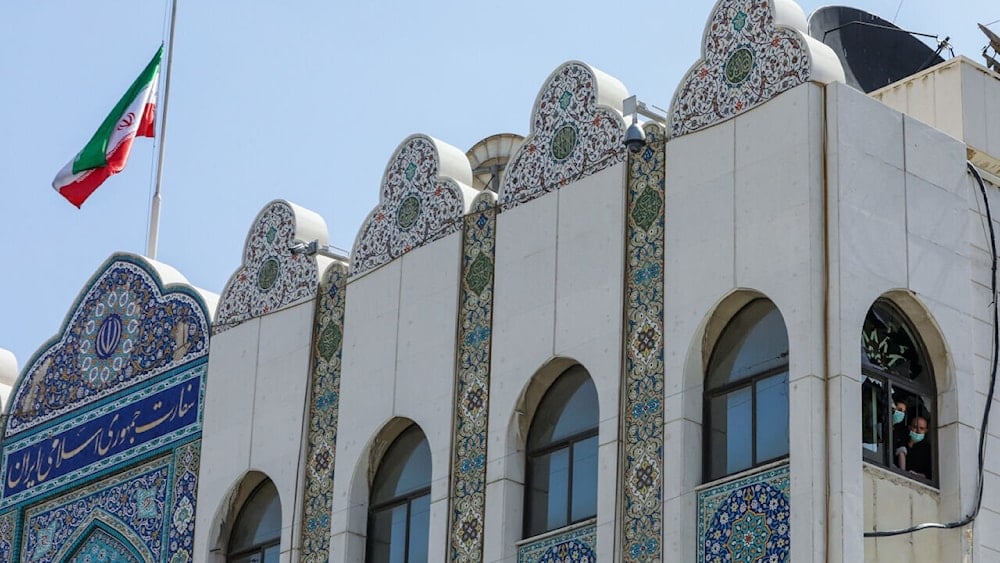Iranian ambassador to Syria: Embassy to resume operations soon
Hossein Akbari confirms the reopening of the Iranian embassy in Damascus and discusses Syria's complex political landscape.
-

Iran's flag is flown at half-mast at the Iranian embassy in Damascus, on May 20, 2024, following the death of Iran's president alongside his foreign minister and others in a helicopter crash. (AFP)
Iranian Ambassador to Syria, Hossein Akbari, announced that the Iranian embassy in Damascus is set to resume operations soon after it was closed as a result of the recent events in Syria.
Speaking on the ongoing situation in Syria, Akbari asserted that "the Israeli occupation regime will not allow the formation of a strong government in Syria."
Regarding the future of Syria, Akbari stated, "Syria will not become like Libya, but it will face some challenges similar to those of Libya."
Earlier, Iran’s Ambassador to Syria Hossein Akbari met in Tehran on Sunday with Foreign Minister Abbas Araghchi who provided the envoy with a series of recommendations to protect Iran’s national interests and push for Syria’s territorial integrity.
The envoy gave a report on the latest developments in Syria following the fall of the regime of Bashar al-Assad and briefed the foreign minister on the arrangements made to ensure the safety and security of the staff members of Iran’s embassy in Damascus and other diplomatic and consular sites in Syria.
On his part, Araghchi gave the ambassador advice about the necessity for constant and close monitoring of the developments in Syria in order to safeguard Iran’s national security and interests, support Syria’s national sovereignty and territorial integrity, and protect regional security and stability.
Foreign powers seek to divide Syria: IRGC chief
Meanwhile, Major General Hossein Salami, the commander of Iran's Islamic Revolution Guard Corps (IRGC), stated that Iran's involvement in Syria is not driven by territorial ambitions or expansionist interests but rather by a commitment to defending the dignity of Muslims.
Salami highlighted the role of foreign powers in destabilizing Syria, describing them as "wolves seeking to divide the country." He elaborated, "The Israelis occupy the South, another force dominates the North, and yet another controls the East, leaving the Syrian people isolated and facing an uncertain future."
Reflecting on Syria's ongoing crisis, Salami described how the collapse of the regime led to a series of devastating events. He highlighted the alarming situation where Israeli forces have gained unprecedented visibility into the daily lives of Damascus residents, portraying it as an unbearable violation of sovereignty and privacy.
He underscored the importance of resilience, saying, "We now understand the critical value of Resistance. The failure of an army to stand firm paves the way for a nation’s occupation. Syria’s experience is a bitter lesson from which we must draw essential insights."
Salami added that the Syrian people recognize the significance of Resistance as a source of dignity amid the unfolding events in Damascus, in reference to the advancing of the Israeli occupation forces in the southern parts of the country towards the capital, Damascus on Saturday.
In closing, he expressed confidence in Syria's eventual liberation, led by its determined and resilient youth.
"Israel will pay a heavy price, with its soldiers buried in occupied Syrian lands. However, this requires time and steadfastness," he affirmed.
Read more: Pathways to support Resistance open, not confined to Syria: IRGC chief

 3 Min Read
3 Min Read








